Russian Runaways Vow to Fight Back Against ‘Parasite’ Putin
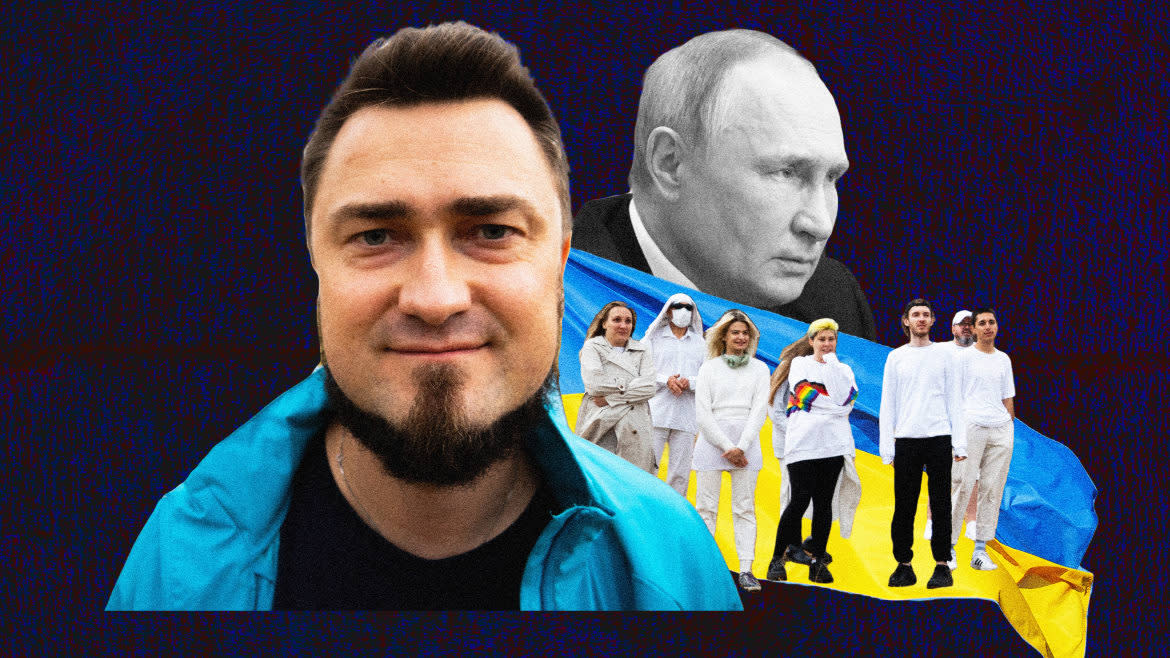
- Oops!Something went wrong.Please try again later.
Shivering under heavy clouds on a beach in the outskirts of Tbilisi, Georgia, a group of Russian exiles are taping their last shots for an anti-war music video. The drone operator and video director keep warm in a gray hoodie with a NASA logo on the back, shouting his orders to the group. Marching forward, they sing a chorus about national shame to the little drone hovering above them.
“With this song we are trying to show that not all Russians are crazy or pro-war. We want to say “we are sorry” to the Ukrainians, that we are crying for their parents or friends who are dead or homeless. To say that we are normal, we are not zombies,” Ilya Denisov, founder of Megatonna, the band shooting the music video, told the Daily Beast.
Following the brutal Russian invasion of Ukraine in February, thousands of Russians left the country. Many of them went to Georgia, a small mountainous country in the Southern Caucasus bordering Russia to the North. Denisov was among them, arriving in March. In September, the country saw an enormous influx of Russians, as president Vladimir Putin called for mass mobilization.
The scores of fleeing Russians were met with harsh criticism from host countries, both in person and on social media. Some were told to turn around and fight the Putin regime from within, while others were met with anti-Russian protesters on the Georgian borders.
When Russia sent a bone rattling wave of missile attacks on Ukrainian civilian targets on Oct. 10, social media was overflowing with messages that “all Russians are guilty,” and are “hated more and more by the day.”
Mayhem at Russian Border as Thousands Flee Putin’s Draft
To Denisov, these feelings of hate and anger are justified.
“If Ukrainians write bad things about us, I understand it. It is okay if they hate everyone. When your friends or parents are killed, it is hard to distinguish between good Russians and bad Russians. They have the right to say that,” Denisov says.
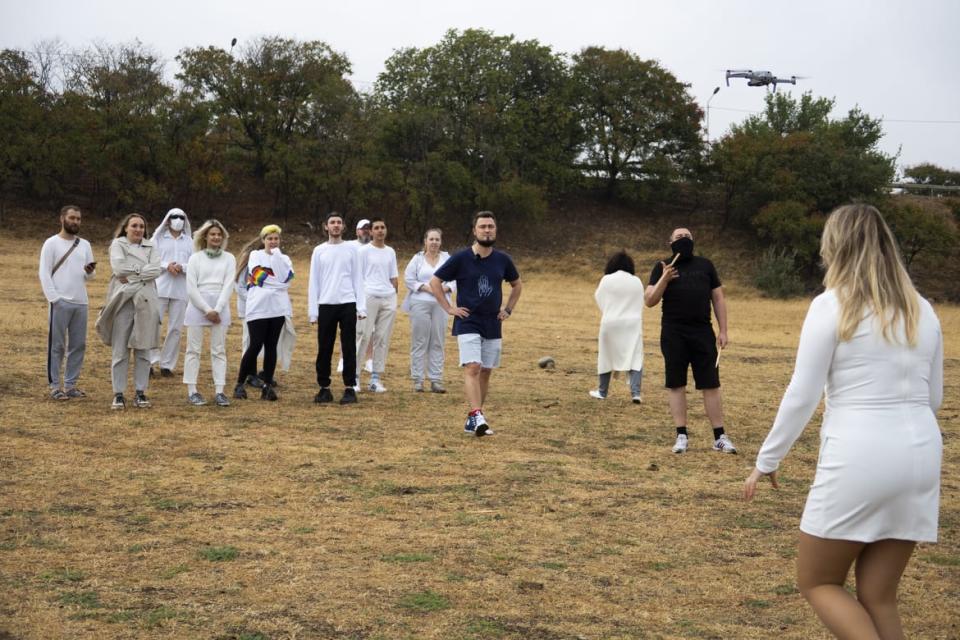
He does not see any way to topple the Russian regime.
“I was in anti-war protests in 2010 or 11. I went for the Navalny protests, and I protested against the changes to the constitution. It didn’t change anything. In the first three days of the war, we went to the center of our city to protest. There were like 7-800 people every time, but police were twice as many,” Denisov said.
“We were ready to protest, but we found out that we would end up in jail or on the frontline, and I wasn’t ready to give up my life and live the rest of my life in prison. I am not as brave as Navalny, but we still want to leave our message: That we are anti-war.”
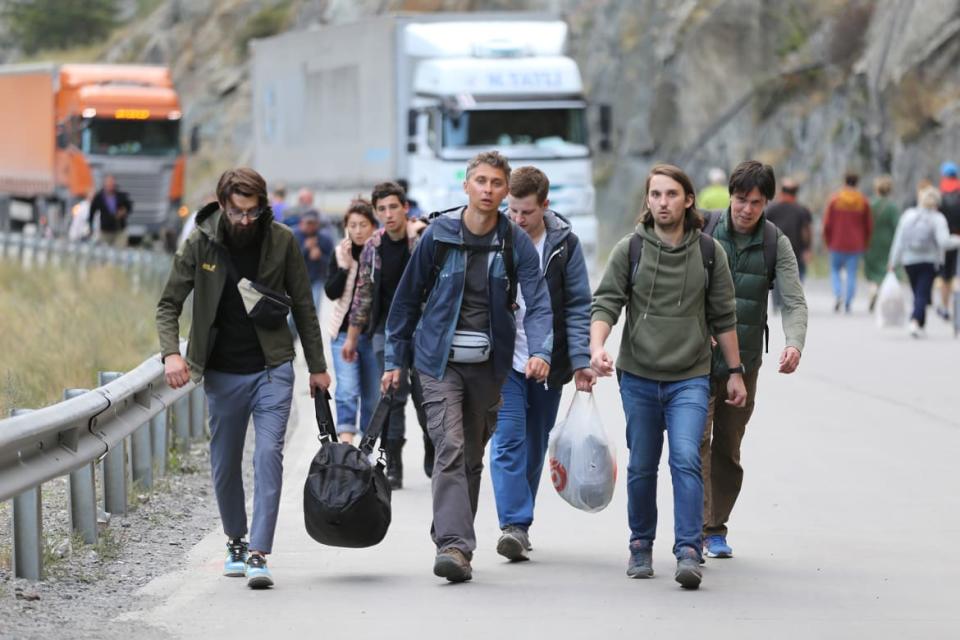
Russians are seen attempting to leave their country to avoid a military call-up for the Russia-Ukraine war as queues have formed at the Kazbegi border crossing in the Kazbegi municipality of Stepantsminda, Georgia, on Sept. 28, 2022.
Though many Russians have already moved on to Turkey and Armenia, Tbilisi hostels and hotels are still overflowing with Russians. One of them, a high school social science teacher, told The Daily Beast he left because he was afraid that what he said in his classroom back in Russia would get him in trouble. A young couple in their early twenties said one of their friends went to fight in the war. Of the 270 people their friend left with, only 40 made it back. Another Russian woman, from the Russian Black Sea city of Krasnodar, was crying after saying goodnight to her mother on a video call.
The future is uncertain for the Russians who left, but more so for the Russians who never made it across the borders. Though they do not have to fear rocket strikes, no one knows what will happen in Russia now, says Denisov. Asked whether his song might have consequences for his family at home, he says “I don’t know.”
“Nobody knows what is going to happen. Crazy things and new laws are created everyday by our Russian crazy state Duma. Nobody knows! But we cannot be silent, we cannot pretend that nothing is going on.”
On Monday, hundreds turned out to protest the war in front of the Georgian Parliament in Tbilisi. Among them, several were Russians. One of them is Nikita Zhurenko, a 23-year-old freelancer who’s been living in the Georgian capital for months.
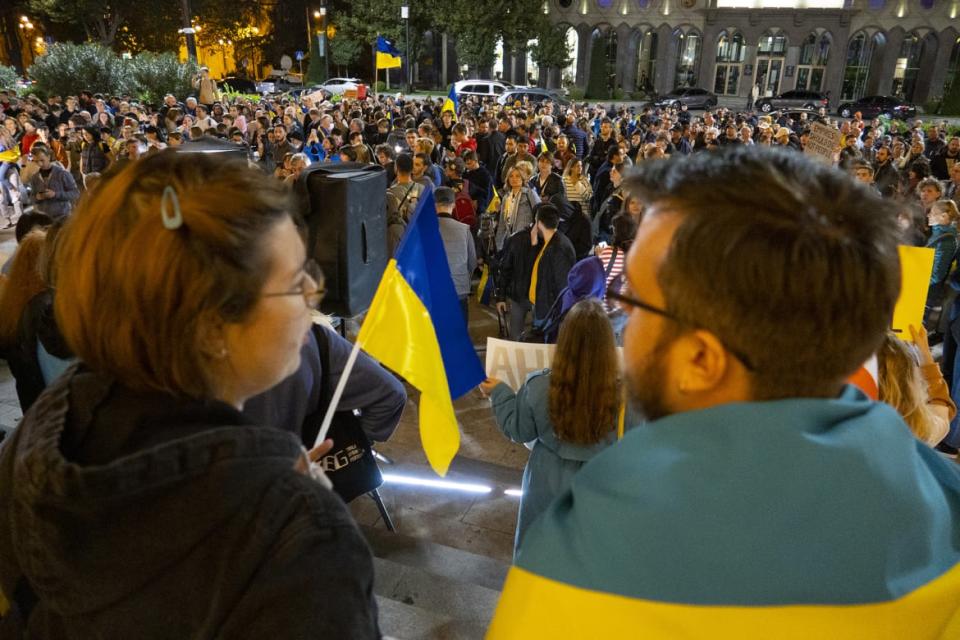
“Since childhood, I have hated this country and its politics,” he told the Daily Beast.
“The government is not doing anything for Russia. They are parasites. They are so shitty. They have created a propaganda machine, there is no freedom, there is no opposition anymore, and then they started the war,” Zhurenko says, claiming he figured out he didn’t like Putin when he was 8 years old.
Despite the fact that Zhurenko, who said hates the Putin regime with a passion, and other Russians exiles are against the war, some Georgians are still weary of the influx of Russian migrants. One of them is Elene Khoshtari, the leader of the small political party, Droa.
“We had a rally protesting the October 10 Kyiv bombings, and I said it was a good opportunity for the Russians to protest safely, but I only met two Russians there. I don’t think the people fleeing mobilization are really anti-war people, they are just fleeing for their personal comfort.”
The Droa party has very limited confidence in the Russian migrants, much of it stemming from the 2008 war between Georgia and Russia, that ended with Georgia losing territory as the two “autonomous” and internationally unrecognized republics of Abkhazia and South Ossetia were taken under Russian control.
The Russian Exiles Risking Putin’s Wrath to Go Home
“I understand these people. It is alright. Because Russia started the war in 2008. It is not really justified, but the Russians who just came out of Russia now, they are not dangerous. They hate Russia. They hate Putin. They hate the Russian system. That’s why they left, and I think we need to support each other,” said Zhurenko.
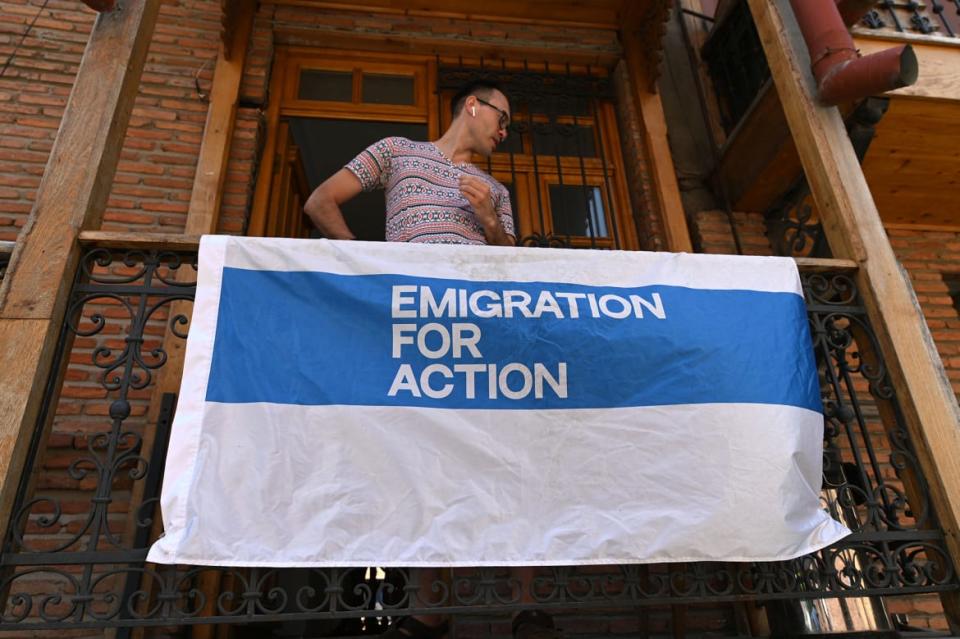
A volunteer for Emigration for Action, an NGO that helps Ukrainians receive medicine in Tbilisi, Georgia.
Zhurenko has just recently started protesting and is not part of any formal organizations. There are, however, active Russian diaspora movements in Georgia, including Emigration for Action—a group represented by a modified version of the Russian flag, without the color red. Daniel Chubar is one of their co-founders.
Chubar was part of the first wave of Russian migrants after being lucky enough to get relocated by his employer. Initially, the plan was for him to stay in Georgia for two to four weeks, but his stay was extended multiple times. With other migrants who, like Chubar, had civil society backgrounds, he started Emigration for Action, a group that helps organize aid deliveries to Ukrainian refugees.
“Personally, I do not know any war supporters. My family and friends share the same attitudes, but some of them just don’t have the resources to leave. They have to stay and live their lives, but I’ve never talked to any of the Z-patriots. A lot of my friends had conflicts with their parents over it, but for me, no. There are no such frictions in my family.”
Get the Daily Beast's biggest scoops and scandals delivered right to your inbox. Sign up now.
Stay informed and gain unlimited access to the Daily Beast's unmatched reporting. Subscribe now.

